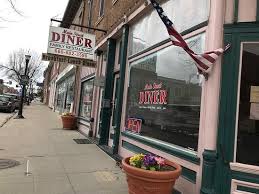None other than A. J. Barnett himself volunteered to talk with David. After all, it was his great need for the cemetery plots that brought the issue to light, and A. J. was certain of his persuasive ability in a matter such as this.
 He began his appeal by inviting David to lunch at the local Main Street Diner right there in heart of Bynum. He figured that he would introduce the idea while they were surrounded by satisfied townspeople eating a hot lunch prepared by Mavis Stevens. No frozen food at the Diner. Mavis cooked it all from scratch and the people of Bynum rewarded her with their loyalty, their generous praise, and their occasionally generous tips.
He began his appeal by inviting David to lunch at the local Main Street Diner right there in heart of Bynum. He figured that he would introduce the idea while they were surrounded by satisfied townspeople eating a hot lunch prepared by Mavis Stevens. No frozen food at the Diner. Mavis cooked it all from scratch and the people of Bynum rewarded her with their loyalty, their generous praise, and their occasionally generous tips.
“David, we have a situation here,” was his opening. He then laid out the “situation” as he saw it.
“That is a problem indeed,” was David’s response, and that was just about all A. J. got from him. David said little else as he enjoyed Mavis’s chicken salad. He particularly like the sliced grapes and slivered almonds Mavis mixed in. A. J. made his case as he scarfed down the best chicken fried steak, cream gravy, and mashed potatoes in the county without even tasting them. By the time he paid the bill, he was not at all satisfied with what had transpired. He had no commitment from David. With as little as David had said, he wasn’t even sure David had listened to most of it. All he got as they parted company in the parking lot was David’s “I’ll give this some thought and let you know.”
Two weeks passed. A. J. had not heard from David. Being a man who liked to get things done, at least those things that were important to him, he called David.
“Well, David, I was calling to see if you had come to any decision about the matter we discussed.”
“I have been looking into the matter and giving it a lot of thought. I was planning to call you after my session this evening. But since I have you on the phone, I can tell you that I will present my proposal at the next Board meeting.”
“Well, David, I’m sure the Board will be rarin’ to hear what you have to say, but could I have a little heads up? After all, I was the one who approached you about all this.”
“That you did, A. J. But you were speaking on behalf of the Board, and I think they deserve to hear it all at once. I will see you at the meeting next week.”
Barnett filled the next few seconds with his barely intelligible blustering, highlighting the importance of having someone with Board experience, such as himself, help to present the ideas in the best possible light.
David listened patiently and then interrupted, “Thank you, A. J., for your concern, but I will be prepared to talk with the Board next week. Thanks for your call.” A. J. was left in mid-sentence with a dial tone.
“Shit,” he growled.
By the following Tuesday night, word that David Murphy would make his proposal was out. It was the talk over coffee in the hardware store, in the Diner, in Sunday School classes, the bank lobby, post office, and other such places where people tended to gather even when they had no particular business to transact. The Board meeting was packed. It seemed Bynum’s entire population of 980 showed up, but of course it was really closer to 100 packed into the room intended for half that size. The air was tense. Birch Loomis, who always brought her knitting, left it at home.
David arrived about five minutes before the meeting was brought to order. He was ushered to the front row where he sat still and impassive, as if he were doing one his yoga exercises.
1 Comment until now
You like suspense, don’t you. I hope you post early tomorrow.
Add your Comment!